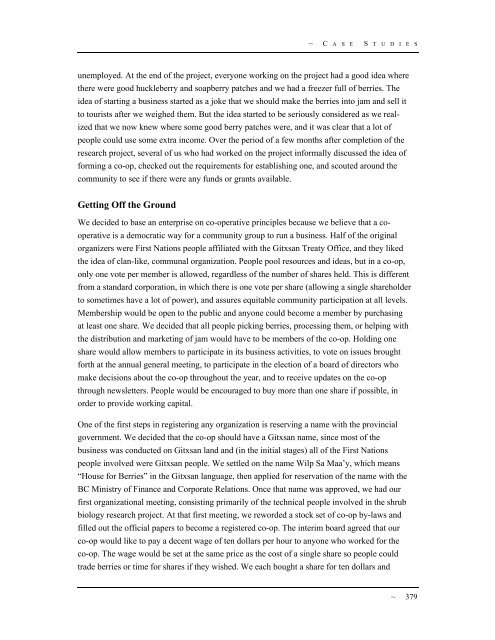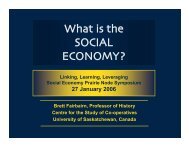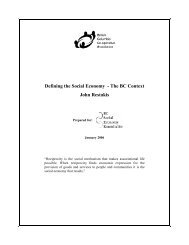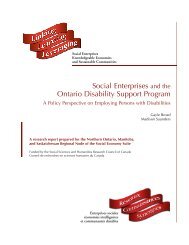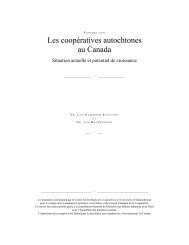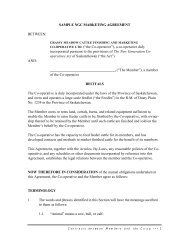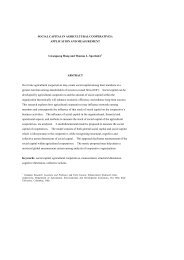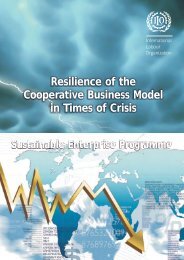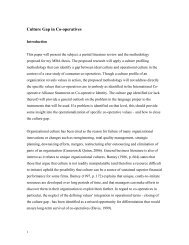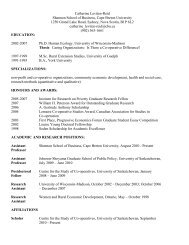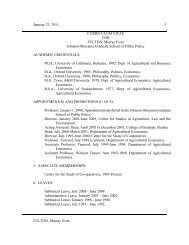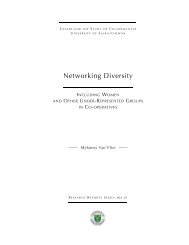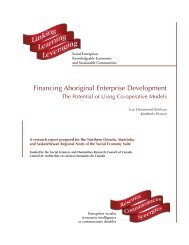Aboriginal Co-operatives in Canada - Centre for the Study of Co ...
Aboriginal Co-operatives in Canada - Centre for the Study of Co ...
Aboriginal Co-operatives in Canada - Centre for the Study of Co ...
Create successful ePaper yourself
Turn your PDF publications into a flip-book with our unique Google optimized e-Paper software.
~ C A S E S T U D I E Sunemployed. At <strong>the</strong> end <strong>of</strong> <strong>the</strong> project, everyone work<strong>in</strong>g on <strong>the</strong> project had a good idea where<strong>the</strong>re were good huckleberry and soapberry patches and we had a freezer full <strong>of</strong> berries. Theidea <strong>of</strong> start<strong>in</strong>g a bus<strong>in</strong>ess started as a joke that we should make <strong>the</strong> berries <strong>in</strong>to jam and sell itto tourists after we weighed <strong>the</strong>m. But <strong>the</strong> idea started to be seriously considered as we realizedthat we now knew where some good berry patches were, and it was clear that a lot <strong>of</strong>people could use some extra <strong>in</strong>come. Over <strong>the</strong> period <strong>of</strong> a few months after completion <strong>of</strong> <strong>the</strong>research project, several <strong>of</strong> us who had worked on <strong>the</strong> project <strong>in</strong><strong>for</strong>mally discussed <strong>the</strong> idea <strong>of</strong><strong>for</strong>m<strong>in</strong>g a co-op, checked out <strong>the</strong> requirements <strong>for</strong> establish<strong>in</strong>g one, and scouted around <strong>the</strong>community to see if <strong>the</strong>re were any funds or grants available.Gett<strong>in</strong>g Off <strong>the</strong> GroundWe decided to base an enterprise on co-operative pr<strong>in</strong>ciples because we believe that a cooperativeis a democratic way <strong>for</strong> a community group to run a bus<strong>in</strong>ess. Half <strong>of</strong> <strong>the</strong> orig<strong>in</strong>alorganizers were First Nations people affiliated with <strong>the</strong> Gitxsan Treaty Office, and <strong>the</strong>y liked<strong>the</strong> idea <strong>of</strong> clan-like, communal organization. People pool resources and ideas, but <strong>in</strong> a co-op,only one vote per member is allowed, regardless <strong>of</strong> <strong>the</strong> number <strong>of</strong> shares held. This is differentfrom a standard corporation, <strong>in</strong> which <strong>the</strong>re is one vote per share (allow<strong>in</strong>g a s<strong>in</strong>gle shareholderto sometimes have a lot <strong>of</strong> power), and assures equitable community participation at all levels.Membership would be open to <strong>the</strong> public and anyone could become a member by purchas<strong>in</strong>gat least one share. We decided that all people pick<strong>in</strong>g berries, process<strong>in</strong>g <strong>the</strong>m, or help<strong>in</strong>g with<strong>the</strong> distribution and market<strong>in</strong>g <strong>of</strong> jam would have to be members <strong>of</strong> <strong>the</strong> co-op. Hold<strong>in</strong>g oneshare would allow members to participate <strong>in</strong> its bus<strong>in</strong>ess activities, to vote on issues brought<strong>for</strong>th at <strong>the</strong> annual general meet<strong>in</strong>g, to participate <strong>in</strong> <strong>the</strong> election <strong>of</strong> a board <strong>of</strong> directors whomake decisions about <strong>the</strong> co-op throughout <strong>the</strong> year, and to receive updates on <strong>the</strong> co-opthrough newsletters. People would be encouraged to buy more than one share if possible, <strong>in</strong>order to provide work<strong>in</strong>g capital.One <strong>of</strong> <strong>the</strong> first steps <strong>in</strong> register<strong>in</strong>g any organization is reserv<strong>in</strong>g a name with <strong>the</strong> prov<strong>in</strong>cialgovernment. We decided that <strong>the</strong> co-op should have a Gitxsan name, s<strong>in</strong>ce most <strong>of</strong> <strong>the</strong>bus<strong>in</strong>ess was conducted on Gitxsan land and (<strong>in</strong> <strong>the</strong> <strong>in</strong>itial stages) all <strong>of</strong> <strong>the</strong> First Nationspeople <strong>in</strong>volved were Gitxsan people. We settled on <strong>the</strong> name Wilp Sa Maa’y, which means“House <strong>for</strong> Berries” <strong>in</strong> <strong>the</strong> Gitxsan language, <strong>the</strong>n applied <strong>for</strong> reservation <strong>of</strong> <strong>the</strong> name with <strong>the</strong>BC M<strong>in</strong>istry <strong>of</strong> F<strong>in</strong>ance and <strong>Co</strong>rporate Relations. Once that name was approved, we had ourfirst organizational meet<strong>in</strong>g, consist<strong>in</strong>g primarily <strong>of</strong> <strong>the</strong> technical people <strong>in</strong>volved <strong>in</strong> <strong>the</strong> shrubbiology research project. At that first meet<strong>in</strong>g, we reworded a stock set <strong>of</strong> co-op by-laws andfilled out <strong>the</strong> <strong>of</strong>ficial papers to become a registered co-op. The <strong>in</strong>terim board agreed that ourco-op would like to pay a decent wage <strong>of</strong> ten dollars per hour to anyone who worked <strong>for</strong> <strong>the</strong>co-op. The wage would be set at <strong>the</strong> same price as <strong>the</strong> cost <strong>of</strong> a s<strong>in</strong>gle share so people couldtrade berries or time <strong>for</strong> shares if <strong>the</strong>y wished. We each bought a share <strong>for</strong> ten dollars and~ 379


